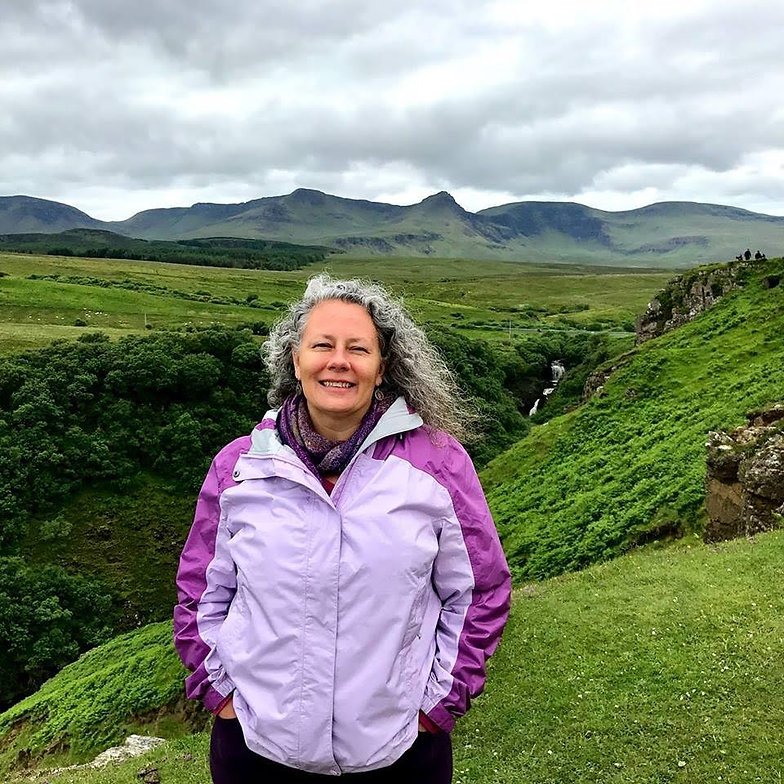Melissa C. Johnson
Melissa C. Johnson's poetry has appeared in Borderlands, Waccamaw, Kakalak, The Connecticut Review, Farmer's Market, The Potomac Review, The Cortland Review, and other journals. Her first chapbook, “Looking Twice at the World,” was published by Stepping Stones Press as a winner of the 2007 South Carolina Poetry Initiative Chapbook Contest. Her second chapbook, "Cancer Voodoo," was a finalist in the Diode Editions chapbook contest and her full-length poetry manuscript, "Forbidden Fruit," was a semi-finalist in the Crab Orchard Series in Poetry First Book Award Competition and received an honorable mention in the 13th Annual Dogfish Head Poetry Prize. She is an Associate Professor and Chair of the Department of Focused Inquiry at Virginia Commonwealth University.
Flight Home
The paunchy body held in at the waist,
by a wide black belt, the round white
arms, tender and vulnerable as the naked
head, hidden under a blue ball cap.
The only sharp angles--pointed cowboy boots;
rocking backward and forward
he watches the other travelers, the tarmac,
the sleeker boys circling one another
and the darker man in his uniform
who seems older, who the others ask questions.
Fifteen miles from base, hundreds from home,
small fidgety groups of Midwestern farmboys,
shorn, fragile, pale as dandruff,
question one another about flying--
how to board the plane,
where the luggage goes.
They tug at the strange feel of jeans,
or adjust the splendid plumage of the olive uniform,
some anxious to return home transformed,
some to return home unchanged--
the same boy who left for basic,
a bit thinner, a bit older
but still the good, steady boy,
hungry for mother's cooking
and the familiar sameness
of small town, tractor,
the milking at dawn.
They touch one another like family,
adjusting a medal, stealing a cap.
Like brothers, they challenge one another
to a race home, a race determined by stand-by
flights, the will of the airlines, the aircraft
they march into, awkward and ill at ease,
excusing themselves with diffident new manners
as they move to the gate, down the center aisle,
into their scattered seats.
Suddenly, these seeming children,
these pale, plucked lads and the one
Latino soldier, who wants to go home
a military man among farm boys,
begin to speak of their future flights--
the desert, Kosovo, Africa--where they will be
where war might come. They seem no older,
but suddenly deadly.
Most Recounted Story at the High School Reunion
The fall came down like rain that year,
a closing off of connections, a muffling.
Cocooned in ourselves, we were fifteen and perfect,
everything on the outside, looking out
through mascaraed eyes into a blurry world,
searching for mirrors, dressed in that ingenuous
slutty way that only teenage girls can pull off:
flashdance sweatshirts hanging from our collarbones,
tight jeans, enough eye makeup to hide behind.
In our small town, we were the hottest thing going,
driving at night on a permit, 5 girls in one cool car,
a black Firebird to cruise Main Street, a steel chrysalis
we blossomed from at Burger King to eat one fry for an hour
and talk about the boys we wouldn't talk to. When the boys
looked at us, and the older women shook their heads,
we never looked back, collecting peripherally trophies
we couldn't hold on to.
We were becoming women in a small town in a backward state.
Our mothers never burned their bras and Jane Fonda was the enemy.
We knew we didn't want to be them with their sad lives,
slaves to husbands and children, to church and monogamy.
Every day was a struggle against going down in the whirlpool.
That night, in the bathroom of Burger King, in a rainbow
of cerulean, jade, and black, the smudged colors
of butterfly wings, I washed away the makeup
my friend had applied, tried to see who I might become
in the mirror, a steelworker who moonlit as a dancer,
a good girl gone bad to get the guy of her dreams,
a mother working at the mill to buy school clothes for her kids,
an uptown girl. Where could I go without a map? Which road led
out of town and would I be brave enough to drive it alone?
My face free to breathe, my eyes cleared, curfew descending,
I drove everyone home. In the wrong lane, passing
a tractor trailer at seventy miles an hour, we met
another car. Pressing down the gas, I swung us
into the future, while everyone held on.
Bones
This is also a story about the body
starved and scarred, stranger
I won't look at in the mirror,
do not recognize in photographs,
the one that eats, cums, spreads,
dimpled and soft, greedy and crass.
Moving, it makes itself known
to chairs, tables, thighs,
always reaching for contact
it rubs against itself.
Inside this body is the one I want,
a geography of ridges and valleys,
the archipelago of the spine,
the dunes of the rib,
the basin of the hipbones.
I could run with this body
and not feel any weight
just bone and muscle, moving.
I would always be cold, empty,
intangible, even when caressed.
To coax this body out
I degrade the other, ignore it.
Nails grow, eyebrows lose their shape,
the skin dries and cracks,
like a snake's to be shed.
I cover it, like a chrysalis,
with dull fabric, in layers.
Hidden and despised,
the body shrinks into stasis,
stays inside, gestates.
This is every woman's body.
It is a communal body,
an ancestral hatred,
a prison beneath the skin,
we are starving to uncover
the bars so that when we turn
sideways, we can disappear.
